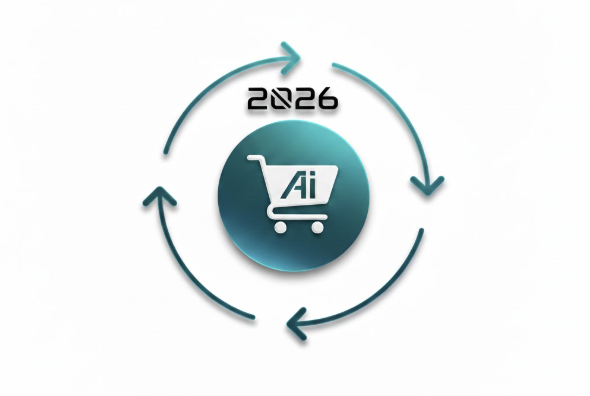46 E-commerce AI Implementation Statistics That Define Digital Success in 2026

Comprehensive data compiled from extensive research across AI personalization, conversion optimization, customer support automation, operational efficiency metrics, and ROI measurement
Key Takeaways
- The AI-enabled e-commerce market will grow from $8.65 billion to $22.6 billion by 2032 at 14.6% CAGR
- 80% of retail executives plan AI-powered automation adoption by end of 2025
- AI personalization delivers conversion rate lifts up to 23% with 40% revenue increases
- Operational efficiency gains include 30-50% forecast error reduction and 35% inventory optimization
- Customer support automation resolves tickets 18% faster with 71% success rates
- 69% of AI adopters report measurable revenue increases while 72% see cost reductions
- Implementation challenges affect 53% of managers citing data security concerns
Current State of AI Implementation in E-commerce: 2026 Statistics
1. The AI-enabled e-commerce market reaches $8.65 billion in 2025
Market valuation confirms AI's central role in modern e-commerce infrastructure. The AI-enabled e-commerce market is valued at $8.65 billion in 2025 with projections reaching $22.6 billion by 2032, representing a 14.6% compound annual growth rate. This explosive growth reflects the technology's proven ability to deliver measurable business outcomes across conversion optimization, operational efficiency, and customer satisfaction.
2. 80% of retail executives expect AI-powered automation by 2025
Executive commitment to AI adoption has reached critical mass. 80% of retail executives expect their companies to adopt AI-powered automation by the end of 2025, signaling a fundamental shift in how businesses view technology investment priorities. This near-universal executive buy-in ensures sustained investment and innovation in AI capabilities.
3. 77% of e-commerce professionals use AI daily in 2025
Daily usage statistics reveal AI's operational integration depth. 77% of e-commerce professionals use AI daily in 2025, up from 69% in 2024. This 8-point increase in just one year demonstrates accelerating adoption as teams discover new applications and refine existing implementations.
4. Only 33% have fully implemented AI despite 71% trying it
The implementation maturity gap reveals significant opportunity. While 71% of online stores have used AI at least once, only 33% have fully implemented AI into their operations, with 47% still in experimental phases. This gap between experimentation and full deployment represents untapped potential for businesses ready to commit to comprehensive AI strategies.
5. Global e-commerce conversion rates reach 3.34% in 2025
Industry-wide metrics show AI's collective impact on performance. The global e-commerce conversion rate reached 3.34% in 2025, up from 3.21% in 2024, with AI-powered improvements driving this increase. While this 0.13% absolute increase might seem modest, it represents billions in additional revenue across global e-commerce.
E-commerce AI Adoption Statistics by Industry Segment
6. 48.9% of retail companies use AI for marketing automation
Marketing automation leads functional AI adoption. 48.9% of retail companies use AI for marketing automation, making it the most common application. This high adoption rate reflects marketing's data-rich environment and clear ROI metrics that justify AI investment.
7. 31% of retailers deploy chatbots and virtual agents
Conversational AI shows strong but growing adoption. 31% deploy chatbots and virtual agents for customer interaction. While lower than marketing automation, this represents the fastest-growing segment as businesses recognize the value of automated customer engagement.
8. 84% of global retailers consider AI implementation a top priority
Strategic prioritization ensures continued investment. 84% of global retailers consider AI implementation in store operations a top priority. This overwhelming consensus indicates AI has moved from experimental technology to essential infrastructure.
9. Personalization leaders enhance marketing efficiency by 10-30%
Top performers achieve exceptional efficiency gains. According to McKinsey, personalization leaders can enhance marketing spend efficiency by 10–30% by focusing on the most relevant content and offers for each consumer. Fast-growing companies derive 40% more revenue from personalization than slower-growing peers.
10. 87% of shoppers excited about GenAI's positive impact
Consumer enthusiasm validates AI investment. 87% of shoppers who have tried GenAI tools are excited about the positive impact the technology has on their shopping journeys. This exceptional approval rating ensures customer acceptance won't limit AI adoption.
Digital Transformation Strategy: AI Implementation Roadmaps
11. 33% of enterprises expected to include agentic AI by 2028
Enterprise software evolution accelerates toward autonomous systems. 33% of e-commerce enterprises are expected to include agentic AI by 2028, up from less than 1% today. This dramatic increase represents a shift toward AI systems that can independently execute complex tasks beyond simple automation.
12. Retail operations software market grows to $1.39 billion by 2025
Infrastructure investment signals commitment to AI transformation. The retail operations software market is projected to grow from $1.3 billion to $1.39 billion by 2025, with AI automation driving real-time analytics and hyper-personalized experiences. This investment in foundational technology enables advanced AI deployments.
13. 68% of CRO professionals use AI-powered personalization tools
Conversion optimization specialists lead AI adoption. 68% of CRO professionals are using AI-powered personalization tools, recognizing the technology's direct impact on their core metrics. This high adoption among specialists validates AI's effectiveness in driving measurable improvements.
14. 73% of consumers open to AI-powered chatbots for service
Customer acceptance enables rapid deployment. 73% of consumers are open to AI-powered chatbots for customer service, while 60% have already used virtual assistants to make purchases through voice commands. This widespread acceptance removes a major barrier to AI implementation.
ROI Statistics: Measuring AI Implementation Success
15. 69% of AI retailers report revenue increases
Revenue impact validates AI investment across the industry. 69% of retailers who implemented AI report revenue increases directly traceable to AI use. This strong majority experiencing gains demonstrates AI's reliability as a revenue driver across diverse retail segments.
16. 72% of AI adopters experience cost reductions
Operational savings complement revenue gains. 72% experienced cost reductions through AI implementation, creating a dual benefit of increased revenue and decreased costs. This combination accelerates ROI and justifies continued AI investment.
17. AI personalization boosts conversion rates up to 23%
Conversion optimization reaches new heights with AI. AI-powered personalization can boost conversion rates by up to 23% through real-time user behavior analysis. This dramatic improvement transforms marginal traffic into profitable customers.
18. Retail chatbots increase sales by 67%
Conversational commerce delivers exceptional results. Retail chatbots increase sales by 67% through enhanced customer engagement and support. This significant uplift demonstrates the value of AI-powered customer interactions throughout the purchase journey.
19. AI personalization generates revenue increases up to 40%
Personalization at scale unlocks substantial revenue growth. AI personalization boosts revenue by up to 40% by delivering individualized experiences to each customer. This level of improvement fundamentally changes business economics and competitive dynamics.
20. 25% of retailers report increased conversion rates from personalization
Consistent improvements validate personalization strategies. 25% of retailers report increased conversion rates after implementing personalization, while 55% see higher average order values. These complementary metrics demonstrate personalization's comprehensive impact on business performance.
21. Personalized recommendations drive 35% of Amazon's revenue
Market leaders demonstrate AI's transformative potential. Personalized product recommendations drive 35% of Amazon's revenue, showcasing how AI can become central to business models. This proven success at scale validates AI investment for retailers of all sizes.
Digital Transformation Examples: Real-World AI Success Stories
22. Amazon uses AI to forecast 400 million products daily
Scale and sophistication define leading implementations. During the 2023 Cyber Monday sales, Amazon used AI systems to forecast a daily demand of over 400 million products and predict order locations based on historical data reserves. This massive scale demonstrates AI's ability to handle extreme complexity and volume.
23. AI adopters improve logistics costs by 15%
Supply chain optimization delivers measurable savings. AI adopters have improved logistics costs by 15% through route optimization, demand forecasting, and inventory management. These operational improvements flow directly to bottom-line profitability.
24. Inventory levels reduced by 35% with AI optimization
Working capital efficiency improves dramatically. AI implementation enables inventory level reductions of 35% while maintaining or improving service levels. This optimization frees capital for growth investments while reducing storage costs.
25. Fast-growing companies derive 40% more revenue from personalization
Performance leaders demonstrate AI's competitive advantage. McKinsey research shows fast-growing companies deriving 40% more of their revenue from personalization than slower-growing peers. This performance gap continues widening as AI capabilities advance.
AI Implementation Barriers and Adoption Challenges Statistics
26. 53% of managers cite data security as primary obstacle
Security concerns remain the top implementation barrier. 53% of retail managers cite data security and privacy concerns as primary obstacles to AI adoption. Addressing these concerns through platforms with strong security credentials like Envive's brand-safe AI becomes essential for successful deployment.
27. 43% blame lack of expertise for implementation failures
Skills gaps challenge AI adoption efforts. 43% blame lack of awareness or expertise for implementation failures. This knowledge deficit highlights the importance of choosing AI platforms that provide comprehensive support and training resources.
28. 42% of marketers face integration challenges with existing tech
Legacy system compatibility creates technical hurdles. 42% of marketers experience integration challenges when implementing AI tools with existing technology stacks, particularly with legacy systems. Modern platforms like Envive's interconnected AI solve this through flexible integration architectures.
29. 68% of marketers worry about potential AI bias
Ethical concerns influence implementation decisions. 68% of marketers worry about potential AI bias that could lead to skewed or unethical outcomes. This concern emphasizes the need for transparent, auditable AI systems with built-in fairness controls.
30. Only 33% have fully implemented AI despite widespread experimentation
The implementation gap represents massive untapped potential. While 71% have experimented with AI, only 33% have fully implemented it into operations. This gap often results from choosing the wrong AI approach, making the selection of custom LLMs versus GPT wrappers critical for success.
Digital Transformation in Business: AI-Driven Customer Experience Stats
31. AI chatbots resolve tickets 18% quicker
Support efficiency improvements are immediate and measurable. AI chatbots resolve customer tickets 18% quicker than traditional methods, reducing customer frustration while lowering operational costs. This speed improvement directly impacts customer satisfaction scores.
32. 71% successful resolution rate for AI chatbots
Effectiveness metrics validate AI customer service capabilities. AI chatbots achieve a 71% successful resolution rate, demonstrating their ability to handle the majority of customer inquiries without human intervention. This high success rate ensures positive customer experiences.
33. Customer support queries reduced by 30% with AI
Query volume reduction frees human agents for complex issues. AI implementation reduces customer support queries by 30% through proactive problem resolution and self-service capabilities. This reduction allows businesses to scale support without proportional cost increases.
34. Customer satisfaction increases by 25% with AI support
Satisfaction metrics improve across AI-enabled touchpoints. Businesses report customer satisfaction increases of 25% after implementing AI support systems. These improvements stem from faster response times, 24/7 availability, and consistent service quality.
35. 60% of consumers have used voice assistants for purchases
Voice commerce adoption signals channel diversification. 60% have already used virtual assistants to make purchases through voice commands, indicating the growing importance of conversational AI in e-commerce. This trend requires businesses to optimize for voice-based product discovery.
E-commerce AI Technology Stack and Integration Statistics
36. AI demand forecasting reduces errors by 30-50%
Predictive accuracy transforms inventory management. Organizations implementing AI-driven demand forecasting can reduce forecast errors by 30% to 50%, dramatically improving inventory efficiency. This accuracy improvement cascades through the entire supply chain, reducing costs and improving service.
37. Lost sales from stockouts decrease by up to 65%
Revenue protection through intelligent inventory management. Lost sales due to stockouts can decrease by up to 65% with AI implementation. This dramatic reduction in lost sales opportunities directly impacts revenue while improving customer satisfaction.
38. Inventory reductions of 20-50% possible with AI
Capital efficiency improves through optimization. Inventory reductions of 20% to 50% are possible with AI implementation while maintaining service levels. These reductions free working capital and reduce carrying costs without compromising availability.
39. 55% of retailers see higher AOV after personalization
Basket size optimization delivers incremental revenue. 55% see higher average order values after implementing personalization. AI's ability to identify complementary products and optimal upsell opportunities drives these improvements.
Digital Transformation Course: Skills and Training Statistics
40. 77% of professionals use AI daily, up from 69% in 2024
Skill development accelerates across organizations. The increase from 69% to 77% of professionals using AI daily demonstrates rapid capability building. This growing proficiency enables more sophisticated implementations and better results.
41. Lack of expertise cited by 43% as implementation barrier
Training gaps highlight education priorities. With 43% citing lack of expertise as a barrier, comprehensive training programs become essential. Platforms that provide built-in education and support accelerate successful adoption.
42. 68% of CRO professionals actively use AI tools
Specialist adoption indicates skill evolution. 68% of CRO professionals using AI-powered tools shows how roles are evolving to incorporate AI capabilities. This specialist adoption drives innovation and best practice development.
Future Projections: E-commerce AI Implementation Trends 2026-2030
43. AI market to reach $22.6 billion by 2032
Long-term growth projections remain robust. The AI-enabled e-commerce market will reach $22.6 billion by 2032, growing at 14.6% annually. This sustained growth ensures continued innovation and capability development.
44. 33% of enterprises will use agentic AI by 2028
Autonomous AI represents the next evolution. 33% of enterprises expected to include agentic AI by 2028, up from less than 1% today. This shift toward autonomous systems will fundamentally change e-commerce operations.
45. 80% of executives planning AI automation by end of 2025
Near-term adoption commitments ensure market momentum. With 80% of executives expecting AI-powered automation adoption by 2025's end, the technology has reached an adoption tipping point.
46. 14.6% annual growth rate for AI e-commerce market
Sustained expansion validates long-term investment. The 14.6% CAGR for the AI e-commerce market significantly exceeds general e-commerce growth, indicating AI's increasing importance in driving sector expansion.
Frequently Asked Questions
What percentage of e-commerce businesses have implemented AI in 2026?
According to recent data, 71% of online stores have used AI at least once, but only 33% have fully implemented AI into their operations. Another 47% remain in experimental phases. Additionally, 77% of e-commerce professionals use AI daily in 2025, up from 69% in 2024, indicating rapid acceleration in adoption rates.
How much does AI implementation typically increase conversion rates?
AI implementation delivers significant conversion improvements across multiple metrics. AI-powered personalization can boost conversion rates by up to 23% through real-time user behavior analysis. Retail chatbots increase sales by 67%, while 25% of retailers report increased conversion rates after implementing personalization. The global e-commerce conversion rate reached 3.34% in 2025, up from 3.21% in 2024, largely driven by AI improvements.
What is the average ROI for e-commerce AI investments?
ROI metrics are compelling across the board: 69% of retailers who implemented AI report revenue increases directly traceable to AI use, while 72% experience cost reductions. AI personalization can generate revenue increases up to 40%, with fast-growing companies deriving 40% more revenue from personalization than slower-growing peers. Logistics costs improve by 15% and inventory levels can be reduced by 35%.
How long does it take to implement AI in e-commerce operations?
Implementation timelines vary by scope and complexity. While 71% of stores have experimented with AI, only 33% have achieved full implementation, suggesting a typical journey of 6-12 months for comprehensive deployment. However, specific applications like chatbots can show results quickly—some platforms report 20% order value increases within the first week of implementation.
What are the most common AI applications in e-commerce?
The most prevalent AI applications include marketing automation (used by 48.9% of retail companies), chatbots and virtual agents (31% deployment rate), and personalization tools (used by 68% of CRO professionals). Demand forecasting and inventory optimization are also widespread, with AI reducing forecast errors by 30-50% and decreasing stockout-related lost sales by up to 65%.
What percentage of online shoppers interact with AI-powered tools?
Consumer interaction with AI is nearly universal: 87% of shoppers who have tried GenAI tools are excited about its positive impact, 73% of consumers are open to AI-powered chatbots for customer service, and 60% have already used virtual assistants to make purchases through voice commands. These high engagement rates indicate strong consumer acceptance of AI-enhanced shopping experiences.
Sources Used
- SellersCommerce – AI Statistics
- Ecomposer – AI Statistics
- SuperAGI – Conversion Optimization
- Capital One Shopping – Research
- BrandXR – Personalization Role
- Neontri – Retail Trends
- LS Retail – Software Trends
- SuperAGI – Hyper Personalization
- Sifted – Amazon Supply
- Bloomreach – Cost Optimization
- MKTG AI – Marketing Impact
- Glassix – Chatbot Study
- ToolsGroup – Demand Planning

Other Insights

Insights with Ajinkya (Jinx) Joglekar

The Financial Inevitability of Custom AI Models

The Ecommerce Reset: What Matters Going Into 2026
See Envive
in action
Let’s unlock its full potential — together.






